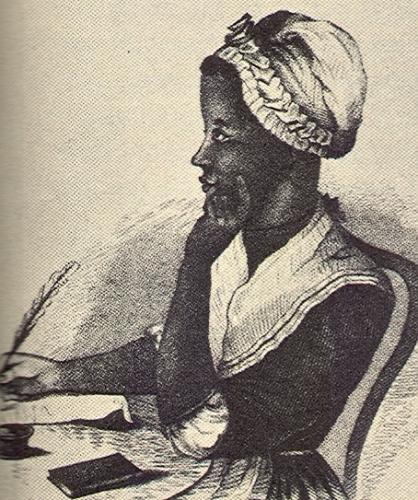 |
LITR 4231 Early American
Literature Sample Research Posts 2014 (research post assignment) Research Post 2 |
 |
Amanda Duarte
Defining Deism
Since my first research post about baroque style in literature was already
stretched thin, I felt the need to take my second research post in another
direction. Although I was raised upon Christian beliefs, I am still open to
learn about other religions and ways of life. As I was looking at the course
website, I stumbled upon the term deism and curiosity sparked. First off, I
surprisingly did not know what the term meant, so I wanted to know more. I
clicked the link for the term and found that it is not so much a religion but
more a philosophy. I was more surprised that I could not remember the term from
our class lecture. To my surprise, my husband, a non-believer in the
supernatural portion of Christianity, would actually be considered a deist. I
had always wondered if there was a term to describe or classify those who do not
believe in religion but do believe that God does exist. Another bit of
information that I found was that the philosophy is connected with the
enlightenment. I was inclined to look into what ways they are connected so I
turned to an outside source to learn more.
The first website I came across was another class website but this one from
gettysburg.edu. On this site I found that deism was actually crucial to the
French enlightenment because of the long history of intolerance and wars between
the Protestants and the Catholics. Deism was thought of as a non-ritual religion
that was supposed to result in the highest moral behavior. Deism was widely
accepted during the 18th century and was also considered a natural
religion, widely accepted as the national religion for a short time after the
French Revolution.
After reading the brief bit of information from the Gettysburg website, I
decided I wanted a little more information about deists and important people
associated with them. Some historical figures associated with deism include
Abraham Lincoln, Alexander Pope, Aristotle, Dmitri Mendeleev, George Washington,
Isaac Newton, James Madison, John Locke, Leonardo Da Vinci, Napoleon Bonaparte,
Victor Hugo, Voltaire, and William Lloyd Garrison, to name a few
(Wikipedia.org). I also found that Dr. White’s website includes some of this
information, especially those historical figures who are associated with our
class including Thomas Paine, Benjamin Franklin, and Thomas Jefferson. After
reading and learning about the Declaration of Independence for class, I can
clearly see the association of deism with the document. I found that Thomas
Paine’s criticism of religious beliefs were much similar to those who had the
same or similar philosophical thought all around the world. According to Dr.
White’s website, under the biographical information on Thomas Paine, I found
that he was actually forced to leave Britain and spent the following ten years
with French affairs. I found this ironic because the French would have more than
likely accepted his beliefs since Deism was an accepted philosophy
Dr. White provided a link to the world union of deism; on that site there is a ton of information on the subject. In the middle of their welcome letter, they claim that the idea of deism clicks with a lot of people because every human has God-given reason:
Deism has the potential to connect with every human being because every human
being possesses God-given reason. Because of this fact, Deism clicks with the
vast majority of people who are made aware of it. This God-given reason, which
is so dear and key to Deism, is the natural state of humanity. The superstitions
of the man-made "revealed" religions are NOT the natural state of
humanity.
According to religioustolerance.org, religion “was
created to give people a feeling of security in an insecure world, and a feeling
of control over the environment where there was little control.” This is not the
first time that I have heard this information. In one of my other classes, Basic
Texts Non-Western Tradition, we learned something extremely similar.
Ironically, as I was watching a TV, I stumbled upon a show on the History
Channel called Banned from The Bible
that discussed the books of the Christian bible that were left out and
forbidden. This struck a discussion between my husband and me about why he
chooses to think that religion is faulty. The show, although I personally do not
believe everything that this channel offers, gives more of a reason for people
to accept the philosophy of Deism. It made me think of Thomas Jefferson’s
thought that the Book of Revelation was written by a lunatic (deism.com).
To understand why people have a deist philosophy, I think it is crucial
to understand all aspects of the way religion was created and has evolved.
Through this research I have learned a great deal about deism including what
defines it, some historical connections including historical figures, a
connection with my personal life, and a better understanding of the philosophy
through religion. I can apply this information when learning about other
religions and history. I can also better connect with people who are deist or
have similar ways of thinking because with an open mind and knowledge of
history, religion, and philosophy, I have found that it makes for a more
interesting and wise person.
Works Cited
http://www3.gettysburg.edu/~tshannon/hist106web/site6/deism.htm
www.history.com/schedules
Friday April 18, 2014 2:00pm
Banned from The Bible
http://coursesite.uhcl.edu/hsh/whitec/texts/AmClassics/founders/Paine/painebio.htm
http://www.deism.com/jeffersonversusrobertson.htm
http://www.religioustolerance.org/rel_theory1.htm#
http://en.wikipedia.org/wiki/List_of_deists
|
|
|
|

